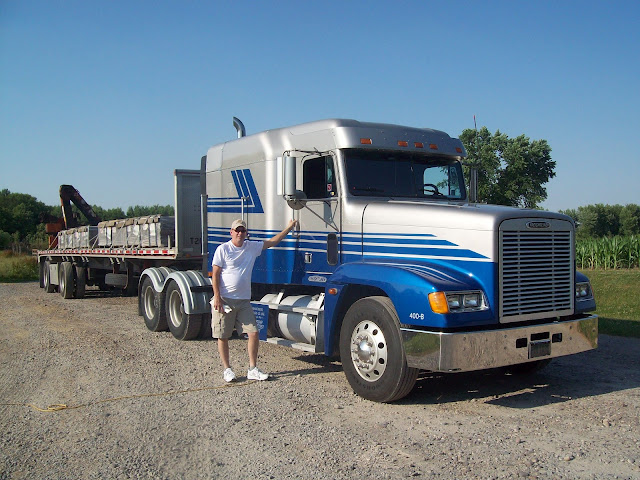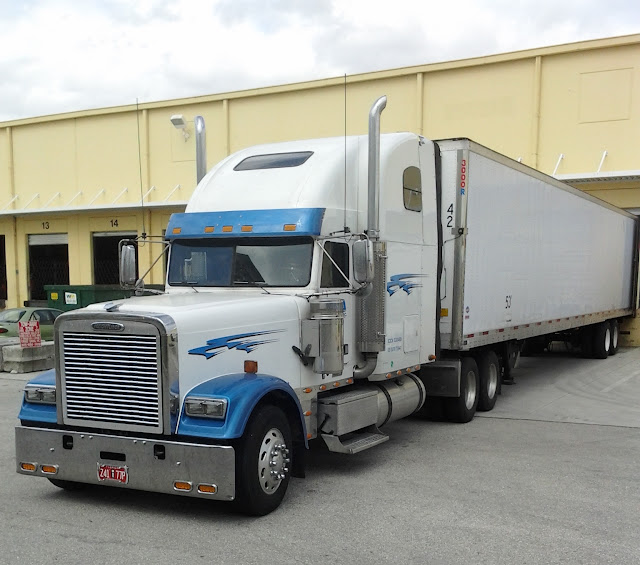– Rick D. Everhart Trucking
– This has been a great truck. 1996 had 1,645,539 miles on it when it dropped a valve, so I rebuilt it.
– Going for 1,000,000 miles again
We are proud to showcase our clients’ trucks on our blog! If you are one of our clients, please send us a picture and details about your truck and we will be happy to post them here. Thank You!
Category: truck taxes
Trucking Spotlight
Be Ready to File Form 2290 for Heavy Highway Vehicles
In order to make the filing process easier with the IRS using Form 2290, it is very important that you keep accurate records, just like you would when filing any other type of tax return. It is crucial for anyone filing form 2290 to maintain their records for at least 3 years prior to the filing date for any taxable highway vehicles registered to them. For fleet owners and small trucking companies who have filed form 2290 in the past, it is wise to always keep the 2290 records on hand, as one never knows when IRS inspection may take place. It is even important to save these returns if they are only for a part of a year. In the case of a suspended vehicle (public highway use was less than 5,000 miles/year) it is still necessary to keep records of Form 2290’s filed for them as well.
You will need to gather the following information before filing form 2290 to accelerate the filing process. You will need a description of all vehicles for which you are filing as well as a VIN (Vehicle Identification Number) for each one. You will also need to know the gross taxable weight of the vehicle. It is also necessary to report the date the vehicle was acquired, as well as the name and address of the previous owner. The first use month for the taxable period is also required for reporting. If a vehicle is considered to be suspended, keep a record of actual highway mileage. If the vehicle is an agricultural vehicle, then keep accurate records of the number of miles it is driven on a farm or field. Keeping proper records of your 2290 information will be a great help to you in the unfortunate event of an audit. It will also make the task of filing this form much easier.
ExpressTruckTax.com is an IRS authorized E-File provider who can help you file form 2290 as well as keep secure online records of previously filed form 2290’s. For more information on the 2290 filing process, heavy vehicle use tax, IRS payment methods, etc visit the Express Truck Tax website or call our Truck Tax experts at 704-234-6005. You can also email any questions to support@ExpressTruckTax.com.
IRS Tax Implications for those in the Trucking Industry
Self-Employment Tax
The Self-Employment tax applies to truck drivers who operate their own business. These taxes are imposed in order to fund the Social Security and Medicare programs. The disadvantage of paying these taxes as a self-employed individual is that you owe twice as much as taxpayers who earn their income from employment. This is because employers are responsible for paying the other half of these taxes for their employees. There is somewhat of a silver lining to this though, the IRS does allow you to claim a deduction for 50 percent of the self-employment tax payments you make as an adjustment to income.
Truck Driver Deductions
You are not required to pay income tax or self-employment tax on your gross earnings from self employed truck driving. Instead, it calculates your tax due on net earnings, which is equal to your gross earnings minus all deductions you can claim. In order to claim a deduction, the expense must be ordinary and necessary to operate your business. This may cover any number of expenses you incur, but typically, truck drivers may deduct the cost of gasoline, oil, truck repairs, insurance and parking charges. You may also deduct the cost of the truck itself by including the lease payments or depreciation of the purchase price in your deductions. And, if you ever stay in a hotel during those long road trips, you may deduct your lodging expenses also.
Other Truck Taxes
IRS Form 2290 is meant to send information about the usage of a commercial truck and to pay taxes on that use to the IRS. You can use this form for a single truck filing, or up to twenty-five vehicles can be reported on one form. The major reasons for filing the form include:
- Calculating and paying the taxes owed on Heavy Highway Use Vehicles
- Claiming a suspension of the tax for vehicles driven less than 5,000 miles during the applicable period (or 7,500 miles if agricultural use)
- Claiming a credit for a sold, stolen or destroyed vehicle
The typical Tax year for Form 2290 is from July 1st to June 30th of the next year. The form and any payment are typically due by the end of August of the corresponding year. The IRS requires that forms with 25 or more vehicles to be electronically filed.
As mentioned Earlier, the typical tax year is from July 1 to June 30, but this year it has changed. Due to legislation being held up in Congress, there has yet to be a legislation enacted to collect these Heavy Vehicle Use Taxes. The IRS has announced that it will not be accepting these 2290 forms until November 1 of this year.
Involving Drivers In The Freight Logistics Process
 |
| Featured Blogger Benjamin Bellville |
Involving drivers in the freight logistics process can be a great way to boost your overall effectiveness when it comes to moving freight and customer relations. Many small trucking company owners don’t understand that this is a process that begins with the hiring of their drivers. First I’m going to show you some things to look for in employees that you will want for your company, then I will outline the ways you can involve them in the freight logistics process and the benefits it will afford your company by doing so.
Driver Hiring Criteria
When you are going to involve your drivers more in the day to day operations decisions you will need to look for a certain type of driver. Just because a driver has a clean driving record and good recommendations does not necessarily mean they are the driver for you and your approach. Here is what you should look for in the interview process.
- Are they business minded?
- Do they have strong organizational skills?
- Do they have great communications skills?
- Do they look professionally presentable?
- Are they experienced in trucking company operations?
- Do they know how to use a load board and book freight?
- Basic computer skills?
- Are they safety and compliance minded?
- Do they believe in driving fuel efficiently?
- Can they perform basic mechanical tasks?
This is just the tip of the iceberg here, and will be dependant on just how much responsibility you want to give your drivers over time. Important to remember is that many truck drivers choose to drive for small companies because they are made to feel like they are more a part of the process and that what they think matters. This type of approach fosters confidence in your company and has a higher retention rating than just treating them like another number in a truck.
If you feel they may just be inexperienced in the industry but are business minded enough to train then by all means give them a shot. Sell your company as a building ground for drivers to build their own business within your business while providing them all of the tools and help they will need to some day branch out on their own. Include them daily in the freight logistics process as by involving drivers you will be shocked at what they are truly capable of. After all they are the ones with the real road experience who have a better idea of what it takes to get freight from point A to B that someone in an office has to guess at.
Teach them how to be your eyes and ears and as a group your company will virtually run itself. Why more companies don’t understand this I will never know. They treat drivers exactly the way they are stereotyped in the news and by society, how does this make a driver feel good about working for you or make them truly care about your business success?
I hope this week’s freight logistics posts have given you much food for thought and an idea of how to approach this topic when you start your company or how to make things better in your current company. Of course this has just been some highlights meant for a basic understanding, it’s up to you to unlock the approach that makes you most comfortable and that you feel provides you the best chance of success.
Did you know that when you start a trucking company you need to file for your HVUT taxes before you can obtain your IRP? Why not let Express2290 show you how they can save you money with fast electronic filing.


